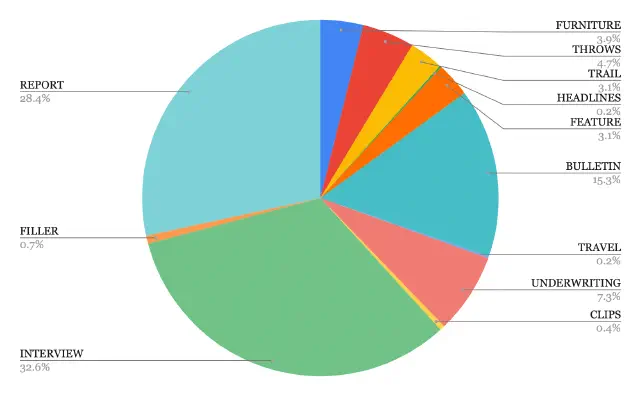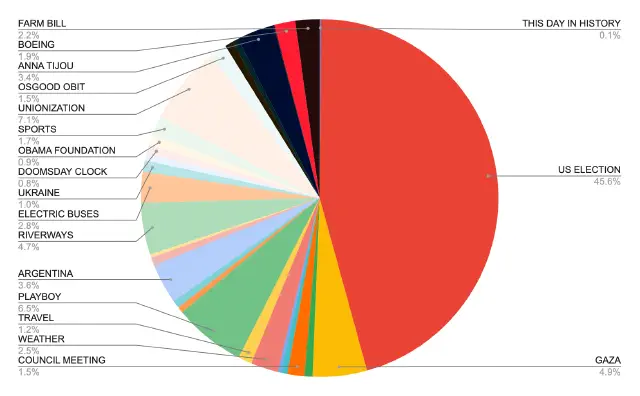Morning Edition on WBEZ - running order for Jan 24
After doing this for BBC Radio 4’s Today programme, RN Breakfast from Australia’s ABC, and Nick Ferrari at Breakfast on LBC in the UK, of course someone said “When are you doing Morning Edition”?
Morning Edition has run since 1979. It lasts for two hours, Wikipedia tells me, but many stations “repeat one or both hours”. NPR isn’t a network and isn’t really a station you can tune into for most Americans: instead, it’s more a program provider to a loose set of member stations, who can pick and choose the output they want to take.
Accordingly, while the NPR website offers the chance to “listen to the full show”, it’s not the full show that you’d hear on the radio; since the program is built according to a clock, containing opt-out points for member stations. So, instead, I listened to 6am to 9am on Chicago’s WBEZ, primarily because this version is available on catchup and my analysis technique requires me to have a recording to transcribe. The last hour was, mainly, a repeat of the first, so this is just analysis of the first two hours, 6am to 8am.
I analysed Wednesday January 24th’s program. (I’d have preferred to do Thursday’s, but my Fridays are busy enough without listening to three hours of unfamiliar radio.) Unlike others, I’ve never heard this show before (though some segments run on ABC NewsRadio), so this is going to be a new experience for everyone.
I ended up with 2,890 lines of text. Of perhaps vague interest - that’s almost identical to BBC Radio 4’s Today (at 2,857 for two hours).
Types of output

“Thanks for starting your day with Morning Edition on Chicago’s NPR news station 91-5 WBEZ,” says Mary Dixon. “It’s nice to see you on the radio,” she adds, rather perplexingly, over a random music beat. Mary pops up quite often, to fill in the gaps from Morning Edition.
There are a lot of clips of random music here, which fade in and fade out. They exist to make timings easier: Morning Edition is on a precise clock, and it’s much easier to hit a clock-start by giving up five seconds early and letting the plinky-plonky jazz fade out. Sometimes we’re left listening to this nondescript instrumental music for a while, only to hear a random voice telling that “This is NPR”.
The amount of voices heard is perplexing. Mary Dixon reads the news, then we hear another voice trailing “All Things Considered from NPR News”, then another voice literally saying “From 3 to 7 today”, then another reading an underwriting credit, then another reading another underwriting credit. In all, between 7.30am and 7.36am, we hear eight different voices.
That’s not to say that we don’t know who some of the other voices are. Steve Inskeep and Michelle Martin introduce themselves no less than ten times in two hours. Mary Dixon introduces herself twelve times. There is a lot of “furniture”, reminding the listener what they’re listening to, who the voices are, and what the time is.
The output is a mix of “report” (a pre-prepared report, or an interview with NPR’s own staff); and interviews with other people. There is a lot of “bulletin”, collections of short news stories. There is also a lot of “throws”, promises of content only seven minutes away.
7.3% of the output is underwriting in some form - the name NPR uses for presenter-read sponsor credits.
One nice moment: NPR carries a piece about Anna Tijou, a latina musician. Nicely, WBEZ’s local announcer comes out of the piece, and mentions when she’s going to play in Chicago next.

The US Election certainly dominates: all this from NPR, of course, with nothing from WBEZ. But a lot of other stories are thrown into the mix, with way more stories covered here than any other I’ve heard this week. That’s possibly due to there being three newsrooms: NPR in Washington, WBEZ in Chicago, and Marketplace in St Paul.
This type of show is entirely alien to me, having not listened critically before. This has been the least pleasurable of my analysis pieces - partially because of its unfamiliarity, but also partially because at no point does the listener get to spend very long with any of these voices before you’re handed off to another one in an exhausting two-hour relay race: and all with the threat of yet another underwriting credit, the most boring of advertisement formats, just minutes away.
It sounds old-fashioned and cautious, and you get the sense that nobody making this program is having any fun. Perhaps the listeners like it that way; but to my, British, ears, this is the vitamin supplement of radio. It’s probably quite good for you, if you can grin and bear it.